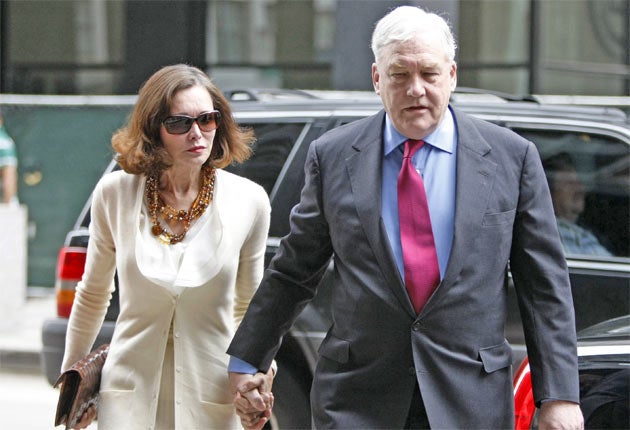Conrad Black's wife collapses in court as he is sent back to prison

Conrad Black, the Conservative peer convicted of fraud and obstructing justice in the US, was last night ordered back to jail amid dramatic scenes in a Chicago courthouse.
His wife, Barbara Amiel, passed out and had to be revived by medics, as the judge disregarded a 20-minute oration by Black in which he argued that he and his family had already "suffered deeply" over eight years of legal action, including his 29 months in prison.
The former proprietor of The Daily Telegraph was freed last year after successfully persuading the US Supreme Court to limit the scope of potential prosecution arguments in fraud cases, after which two of his four convictions were quashed. Judge Amy St Eve yesterday slashed his sentence from 78 months to 42 months in order to reflect the reduced number of convictions, and his work as a teacher and mentor in prison, but Black will still have to serve almost another year before time off for good conduct.
Black accepted that "a reasonable person could conclude that I am guilty of these two offences. The same reasonable person could also conclude that I have been adequately punished."
The peer's lawyers put his and Ms Amiel's failing health among the arguments for clemency, and Ms Amiel in particular looked frail even as she walked into court. She had put off heart surgery until after her husband's fate was decided, according to court filings.
What they did not argue was that Black should be given credit for accepting responsibility or expressing remorse, and his long and eloquent speech to the judge exhibited all the defiance with which he has approached his travails. He argued again that he had been brought down by corporate governance zealots and vindictive prosecutors, and appeared to cast the whittling of the original 17 counts against him down to two convictions as a great victory.
Expanding his military theme, he went on to express gratitude to an "initially small and intellectually brave group of supporters" which he said "has grown to become an army with people in every state in this country, in every province of Canada and in every region of the UK".
At the height of his powers, the Canadian-born businessman controlled a media empire that was the third-largest in the English-speaking world. He hobnobbed with billionaires in New York and with the Conservative establishment in the UK. Margaret Thatcher was on his corporate advisory board, and in 2001 he was appointed a Tory member of the House of Lords.
But his Chicago-based company, Hollinger International, unravelled after he was ousted in 2004 and it was revealed how he had used the company as a personal piggy bank to fund his lavish lifestyle.
Furious shareholders called it a "corporate kleptocracy" and he was found guilty of skimming money for himself by inserting bogus clauses into corporate deals. The obstruction of justice conviction was sealed by CCTV of the mogul loading boxes of documents into the back of his limousine, in defiance of a regulator's order. "This case is in a different state today, and you are a different person today," Judge St Eve told him, but the remarks she made at his first sentencing in December 2007 still held. "I still scratch my head as to why you engaged in this conduct. Nobody is above the law, not even you, no matter what their stature in life."
Ms Amiel, who had been weeping on occasion throughout the morning-long proceedings, fell sideways in her seat when it was announced her husband would be returning to jail. She was lain on the court bench while medics were called and later walked from the courtroom with friends and marshals on each arm.
Leaving the court building later, with Black holding her tightly by the shoulder, she explained to a reporter: "Too little sleep." Black, in his only remark after the hearing, said he was "not surprised" by the ruling.
Much of the hearing was given over to a discussion of Black's 29 months in the Coleman correctional facility in Florida, which his lawyers said had not only profoundly changed him but where his teaching has profoundly changed the lives of scores of inmates.
At his first sentencing, the defence submitted character references from rich, powerful and famous supporters including Sir Elton John. This time, they added 18 letters from inmates describing him, in the words of his attorney Carolyn Gurland, as a "tutor, teacher, and mentor for countless men". The inmates praised Black for helping them pass the equivalent of high school exams, for offering the best lecture series the prison had ever seen, and even for giving advice on job hunting on the outside. One summarised the peer's advice on interview technique as: "pull your pants up and look appropriate".
Black, wearing a dark suit, blue shirt and red tie, asked to sit after 20 minutes spent standing in front of the judge as the legal arguments went on. Attorney Julie Porter, for the government, accused Black's legal team of exaggerating his conduct in prison and asked the court to consider whether the 18 felon correspondents wanted something from a man they knew to be rich.
Join our commenting forum
Join thought-provoking conversations, follow other Independent readers and see their replies
Comments
Bookmark popover
Removed from bookmarks